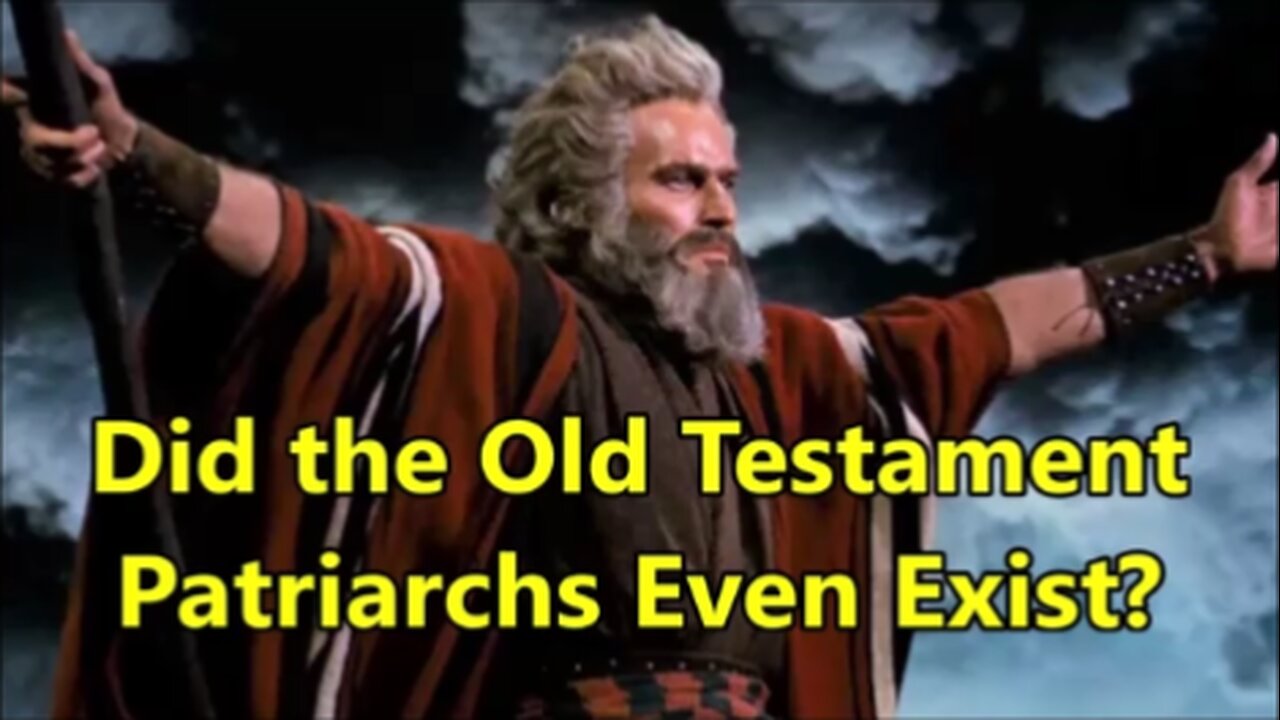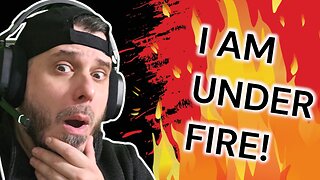Premium Only Content

Did the Old Testament Patriarchs Really Exist? Part 2 of 2 – Pete Papaherakles.
Part 2 of 2. The discussion explores the historical authenticity of the Old Testament, suggesting it may be heavily influenced by Jewish deception and secret societies. Key points include the Jewish control over media and beliefs, the concept of Pardes (four levels of understanding in the Old Testament), and the Kabbalah's mystical interpretation. The conversation questions the historical existence of biblical figures like Joseph, Nebuchadnezzar, and Solomon, and challenges the traditional narrative of the Old Testament's origins. It also touches on the strategic use of victimhood by Jews and the manipulation of historical narratives for political and religious control.
See the Pete Papaherakles playlist of videos at https://old.bitchute.com/playlist/3U7qDqfXKIq7/ .
Outline
Influence of Jewish Beliefs and Media
• Pete discusses the significant influence of Jews in the world today, particularly in shaping beliefs through media, movies, and music.
• Pete lists numerous historical events that are believed to be false or misrepresented, including World Wars, Kennedy assassinations, and 9/11.
• The concept of global warming is highlighted as a major deception, with Pete referencing Michael Hoffman's book for more information.
• Pete introduces the concept of Pardes, an acronym for four levels of understanding in the Old Testament, and its connection to Greek philosophy.
Levels of Understanding in the Old Testament
• Pete explains the four levels of understanding in the Old Testament: Pesha (literal interpretation), Remez (allegorical), Derouche (esoteric), and Sod (magical).
• The process of initiating individuals into these levels of understanding is described, with the Pharisees as an example.
• Pete mentions the Kabbalah as the mystical interpretation of the Old Testament, which includes the magical meaning of the narrative.
• The discussion includes a comparison to Winston Churchill's quote about the Soviet Union, emphasizing the layers of deception.
Christianity and Astrotheology
• Pete and Brian discuss the connection between Christianity and astrotheology, suggesting that Jesus and the 12 disciples represent the sun and the zodiac signs.
• The virgin birth is linked to the constellation of Virgo, and the 12 disciples are seen as the 12 signs of the zodiac.
• Pete explains the concept of numerology and its role in the Bible, with examples like the number 365 for Enoch's life and the 153 fish caught by Jesus' disciples.
• The discussion touches on the hidden ciphers within the narrative, such as the number 666 in the Book of Revelation.
Predictive Programming and the Second Coming
• Pete and Brian explore the concept of predictive programming, where historical events and religious narratives are used to shape future expectations.
• The discussion includes the idea that the Second Coming of Jesus is used to justify the establishment of a new world order.
• Pete mentions the role of the Antichrist in Jewish and Christian beliefs, with Jews viewing him as their Messiah.
• The conversation highlights the manipulation of beliefs through secret societies and magical thinking, with references to Neoplatonism, Neopythagoreanism, and Gnosticism.
Historical Figures in the Old Testament
• Brian questions the historical existence of characters in the Old Testament, with Pete mentioning Joseph, Pharaoh, and King Nebuchadnezzar.
• The discussion includes the Tower of Babel and the Hanging Gardens of Babylon, with Pete expressing skepticism about the Tower of Babel.
• Pete mentions the legend of Solomon as a magician and the potential fabrication of the Old Testament.
• The conversation touches on the Greek influence during the time of the Old Testament, with references to the Septuagint and Ptolemy.
Jewish Identity and Historical Narratives
• Pete and Brian discuss the origins of the Jews, with references to the hibiru or abiru and their nomadic nature.
• The conversation includes the idea that the Jews assimilated writings from surrounding civilizations to create their identity.
• Pete mentions the Talmud and the Kabbalah, noting their Greek influences and the lack of a proto-Jewish version of the Old Testament.
• The discussion highlights the role of Jewish scholars like Jonathan Adler, who question the historical existence of the Old Testament.
Jewish Control and Victimhood
• The conversation includes the idea that the Jews have mastered the cult of victimhood, making it difficult to criticize them in the mainstream.
• Pete mentions the Ukrainian conflict and the portrayal of Putin as a villain, with references to historical parallels.
• The discussion concludes with a reflection on the power of Jewish influence and the manipulation of historical narratives.
-
 23:42
23:42
Robbi On The Record
2 days ago $5.29 earnedMAGA 2.0? BTS of Michael Carbonara for Congress
43.7K7 -
 LIVE
LIVE
GritsGG
2 hours ago#1 Most Warzone Wins 4000+!
323 watching -
 LIVE
LIVE
Joker Effect
24 minutes agoSTREAMER NEWS: WHAT IS JOKER DOING?! Where is the streamer space going now?! Q & A
228 watching -
 LIVE
LIVE
Eternal_Spartan
3 hours ago🟢 Eternal Spartan Plays Arc Raiders - New Updates! | USMC Veteran
57 watching -
 LIVE
LIVE
CODZombieGod115
8 hours ago $0.04 earned🟢 Live - Ashes Of The Damned Round 100 Attemp or Easter Egg Attempt! Black ops 7 Zombies
48 watching -
 DVR
DVR
Mally_Mouse
1 day ago🔥🍺Spicy HYDRATE Saturday!🍺🔥-- Let's Play: Cuff Bust
32.7K2 -
 2:06:12
2:06:12
SavageJayGatsby
9 hours ago🔥🌶 Spicy Saturday – Cuff Bust Chaos! 🌶 🔥
22.2K -
 58:35
58:35
WanderingWithWine
4 days ago $3.49 earnedLive in FLORENCE ITALY for €80k? | 6 Houses For Sale in Italy
9.92K3 -
 1:02:05
1:02:05
Live From The Casita
1 hour ago $0.25 earnedLive Music Jam
2.07K -
 3:45
3:45
Gun Drummer
13 hours agoThree Days Grace - I Hate Everything About You (GUN COVER)
9.3K2